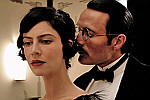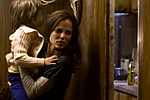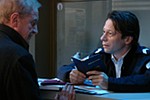 Shadows off the beaten path
Shadows off the beaten pathHIERRO | WILD GRASS | WOMEN WITHOUT MEN
< < F O R E I G N > >
last update 1.Jun.10
See also: SHADOWS FILM FESTIVAL
 R E V I E W B Y R I C H C L I N E
R E V I E W B Y R I C H C L I N E
scr Chris Greenhalgh
prd Chris Bolzli, Claudie Ossard
with Anna Mouglalis, Mads Mikkelsen, Elena Morozova, Grigori Manoukov, Rasha Bukvic, Nicolas Vaude, Sophie Hasson, Catherine Davenier, Olivier Claverie, Anatole Taubman, Natacha Lindinger, Marek Kossakowski
 release Fr 30.Dec.09,
release Fr 30.Dec.09, US 11.Jun.10, UK 23.Jul.10
09/France 1h58
CANNES FILM FEST
TORONTO FILM FEST
 This impeccably made movie tells another chapter in the life of the famed designer with enough awkward, real-life details to make it thoroughly believable. If only the film didn't feel so plodding.
This impeccably made movie tells another chapter in the life of the famed designer with enough awkward, real-life details to make it thoroughly believable. If only the film didn't feel so plodding.
In 1920, seven years after the disastrous Paris premiere of The Rites of Spring, composer Igor Stravinsky (Mikkelsen) meets one of his biggest fans, now-successful Coco Chanel (Mouglalis). As he's living and working in a tiny flat with his wife Katia (Morozova) and four kids, Coco invites them to stay in her gorgeous villa outside the city. And as he works on music and she tries to create a perfume, their torrid affair is hardly a secret. The question is how long Katia, who's suffering from tuberculosis, will stick around.
Writer Greenhalgh, working from his own book, avoids the traps of biopics that bend real events to fit a dramatic structure. This film has the feel of truth about it in the way it's filled with tiny moments and intimate interaction. But it also has virtually no dramatic pace or momentum, and we constantly long for a big confrontation, or maybe a random dramatic event that stirs things up. Instead what we have is a collision of two strong-willed artists.
And Igor is so old-world that he can't even see Coco as the artist she is. "You're just a shopkeeper," he says dismissively. And it's in scenes like this that Mikkelsen shines as a man struggling with the past, present and future, both in his life and his work. This is such a finely detailed performance that it says everything that needs to be said about the characters around Igor as well. Coco's fierce independence and avant-garde ideas, played coolly by Mouglalis, are thrown into stark relief through Mikkelsen's eyes, as is the way Morozova portrays Katia's inner struggle.
Meanwhile, Kounen invests in the set design, which is seriously eye-catching as it confidently recreates Chanel's iconic use of black and white, plus splashes of texture. David Ungaro's cinematography captures this with lavish detail, while Gabriel Yared's score echoes Stravinsky's musical style. In other words, it's sumptuous to look at and full of aching emotion, but never quite breaks the surface.
28.Apr.10
 R E V I E W B Y R I C H C L I N E
R E V I E W B Y R I C H C L I N E
scr Javier Gullón
prd Alvaro Augustin, Jesus de la Vega
with Elena Anaya, Bea Segura, Mar Sodupe, Andres Herrera, Miriam Correa, Kaiet Rodriguez, Javier Mejia, Hugo Arbues, Raquel Salvador, Jorge Lobo, Jon Ariño, Tomas del Estal
 release Sp 15.Jan.10,
release Sp 15.Jan.10, UK 18.Jun.10
09/Spain 1h34
CANNES FILM FEST

 Otherworldly visuals give this dramatic thriller a visceral kick. Director Ibanez continually finds inventive ways to put his central character's inner turmoil so vividly on screen that we feel like we're living this ordeal with her.
Otherworldly visuals give this dramatic thriller a visceral kick. Director Ibanez continually finds inventive ways to put his central character's inner turmoil so vividly on screen that we feel like we're living this ordeal with her.
Single mum Maria (Anaya) works in an aquarium and teaches her 5-year-old son (Rodriguez) all about the sea. As they head to Hierro Island on holiday, she loses him on the ferry, which launches her into a waking nightmare in which she's afraid to go near water. This kind of makes it impossible for her to go back to work, as does her insomnia. When she returns to the island with her friend Laura (Segura) to meet the police, she discovers that he's not the first missing boy on the island.
The music tells us this is a scary movie even before the first image (of an iguana) appears on screen. And that unnerving prologue is shot and edited with visceral artistry that continues throughout the film. But even more importantly, the filmmakers grab us with Maria's inner torment, cleverly using images of water, showers, swimming pools and the ocean to freak her (and us) out. While subtle effects and camera trickery add to the atmosphere.
Hierro is the smallest, southernmost Canary Island, and its isolation and prehistoric landscape are skilfully depicted by director Ibáñez, who stirs plenty of tenderness into the film's most unsettling moments. So by the time more full-fledged intensity appears, we're completely hooked. We care about Maria and her anxious quest to find the truth. Memorable touches include a stunning sequence in which Maria swims like a mermaid in the surf.
But then the film is packed with these kinds of scenes, which are both visually impressive and darkly engaging. Like Guillermo del Toro and Alejandro Amenábar, Ibanez has a confident, haunting approach. The climactic confrontation is shocking mainly because it's so emotionally charged. And there's still a half-hour left, which leaves us feeling a little let down by the conclusion. In the end, this isn't a horror movie after all: it's a wrenching examination of motherhood pushed over the brink, where the line between insanity and desperation isn't terribly clear-cut.
6.Jun.10
 R E V I E W B Y R I C H C L I N E
R E V I E W B Y R I C H C L I N E Les Herbes Folles
Les Herbes Folles
prd Jean-Louis Livi
scr Alex Reval, Laurent Herbiet
with Andre Dussollier, Sabine Azema, Emmanuelle Devos, Mathieu Amalric, Anne Consigny, Michel Vuillermoz, Annie Cordy, Sara Forestier, Nicolas Duvauchelle, Vladimir Consigny, Dominique Rozan, Roger-Pierre
 release Fr 4.Nov.09,
release Fr 4.Nov.09, UK 18.Jun.10, US 25.Jun.10
09/France StudioCanal 1h44
CANNES FILM FEST
TORONTO FILM FEST
 At age 87, director Resnais creates a playful and often infuriating comedy about the impulsive things people do in reaction to something unexpected. And even though it's not an easy film, it's still great fun.
At age 87, director Resnais creates a playful and often infuriating comedy about the impulsive things people do in reaction to something unexpected. And even though it's not an easy film, it's still great fun.
When the imaginative Georges (Dussollier) finds a wallet in a parking garage, he begins to wonder about the owner. He hands the wallet to a cop (Amalric) and goes home to his wife (Anne Consigny), with whom he has two adult children (Forestier and Vladimir Consigny). Meanwhile, the wallet's owner, Marguerite (Azema), also begins to wonder about this strange man who found it. But when they get in contact, strange obsessions lead to irrational decisions and actions. Or maybe they're just imagining what could possibly happen.
Frankly, by the time the film's plot unravels into farce, we're not really sure what's happening. But by then we don't care. We've been hooked from the opening scenes, which open up like Amelie with Edouard Baer's witty narration pondering fate while the voiced thoughts of Georges and Marguerite let us glimpse their fuzzy logic. And it's this confusion that makes the film so special, because it resolutely refuses to follow a neat and tidy narrative.
Resnais gives us the perspective of an omniscient god, as the camera soars down into scenes, following characters from overhead or behind while paying attention to tiny details. It's clever, witty filmmaking, punctuated with moments that are truly wonderful. And as these two people develop a kind of deranged hold on each other, the film slips into either fantasy or madness, with surreal scenes that are snappy and sassy but thoroughly confusing.
Yes, it feels indulgent, especially as we realise that the plot can't be trusted. The script continually suggests possible alternative outcomes, and yet we never predict where the story's headed. (Even after we've seen it, we're not quite sure where it's gone.) This is the kind of film that lingers in the mind and keeps us smiling, because we know how irrational but marvellous it is to latch on to a complete stranger in a way that makes no sense, like wild grass sprouting through a crack in the motorway.
26.Apr.10
 R E V I E W B Y R I C H C L I N E
R E V I E W B Y R I C H C L I N E
prd Susanne Marian
with Shabnam Toloui, Pegah Ferydoni, Arita Shahrzad, Orsolya Toth, Essa Zahir, Bijan Daneshmand, Tahmoures Tehrani, Navid Akhavan, Mina Azarian, Rahi Daneshmand, Salma Daneshmand

release US 9.Apr.10,
UK 11.Jun.10
09/Morocco 1h39
TORONTO FILM FEST
SUNDANCE FILM FEST
 Artfully shot and directed, this film explores the events surrounding Iran's momentous 1953 coup. Even though we may struggle to fully understand what the filmmaker is saying, it's involving and utterly unforgettable.
Artfully shot and directed, this film explores the events surrounding Iran's momentous 1953 coup. Even though we may struggle to fully understand what the filmmaker is saying, it's involving and utterly unforgettable.
Four women are struggling to cope with their place in Tehran society as their country is going through serious political upheaval. Almost 30, Munis (Toloui) lives with her brother (Zahir), who insists that she find a husband even though she doesn't want one. Her young friend Faezeh (Ferydoni) is trying to do everything the correct way; Zarin (Toth) is trapped working in a brothel. And at nearly 50, Fakhri (Shahrzad) leaves her husband (Tehrani) to open an orchard that becomes an oasis for the other women to escape their restricted lives.
Munis' opening narration refers to the fact that the only way to escape pain is to escape life, so we know this isn't going to be a cheerful film. And yet writer-director Neshat injects the story with so much life that we see hope in the most hopeless situations. The film also has a beautiful dream-like quality that mixes in magical surrealism alongside the harsh reality. Particularly lyrical cinematography creates this effect, cleverly contrasting the gritty situation in the city with Fakhri's verdant paradise.
Along the way, we also get a remarkable education in Iran's history, starting with the British blockade that led to street protests and ultimately the collapse of the government. It's impossible to watch this without seeing the parallels in today's Middle East, not to mention of course the fact that what's happening there today is directly related to Europe's actions so many decades ago. But this issue isn't dwelt on at all; writer-director Neshat keeps the film personal and evocative.
The main issue here is Iran's gender divide, which also has modern-day parallels, as these women grapple with their lives in a society that is slanted completely in favour of men. Scenes constantly take our breath away with their sheer audacity and honesty (this film could never have actually been made in Iran). And the film's lingering impression is of the idyllic nature of the women's orchard in contrast with the violent, controlling world outside that the men have made for themselves.
14.Apr.10


See also: SHADOWS FILM FESTIVAL
© 2010 by Rich Cline, Shadows
on the Wall